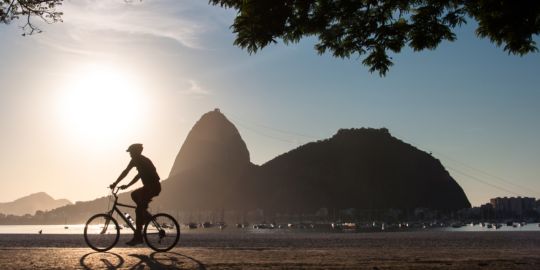ask me or read riorealblog.com
Anything you'd like to know about Rio's amazing turnaround?
Hi JuliaMichaels,
Welcome to Expat.com!
Maybe you could introduce yourself?
Thank you.
Hi Christine, sure thing! I've been in Brazil over half my life, 31 years last week. Part of the time was in São Paulo, and I've lived in Rio since 1995. I worked as a journalist in the 80s, brought up three children and did five years in publishing. Two years ago I created my blog, about the transformation of Rio-- and I love my work. Until 2009 I never imagined that Rio could actually turn itself around. I'll be giving a talk on this at the American Society August 14.
Hi Julia,
I'd like to express my personal opinion:
While nobody can deny that Rio is not the city it was a few years ago and that major changes are taking place, they are few, long overdue and slow in coming. I feel that it is a bit irresponsible to paint a picture that Rio has as if by magic become "Heaven on Earth" overnight, it simply is not true.
Sure, life has changed substantially in many of the "pacified" favelas and the government has finally taken to heart that they are the ones who should be looking after the needs of the resident population, not just letting the drug traffickers fill that role. The fact remains that drugs and the related violence, violent crimes such as murders, armed robberies, kidnappings, carjackings, etc., continue to take place in Rio on a daily basis.
The shootouts between police and traffickers have not ended, only this morning there was another confrontation and shootout in Jacarezinho. Despite the major druglord's video declaration that they would no longer be selling crack in Jacarezinho, police recovered a large quantity of drugs (including crack) during the operation.
Drugs and violence are only two of the major problems that Rio is facing. The public healthcare system is in chaos and totally incapable of serving the needs of the general public. Major hospitals are in a state of complete abandonment, patients in the hospitals that are functioning are warehoused in corridors waiting hours or days for treatment. Patients are dying in the shuffle between one hospital that can't attend them and one that can.
Cities in the interior of the state are no better off either. I live in Macaé and just like everywhere else in Brazil, in an election year some things get done. Generally speaking things that are long overdue and for which funding has been in place for years and works simply have been stalled. It is a disgrace that while the City of Macaé, without any shame whatsoever, spends public money on television (pre-election propaganda) ads showing such improvements as the UPA in Lagomar, portraying it as if it were new and in operation, while in fact it was completed well over a year ago and has never entered into operation because there is no piped water in the bairro. Meanwhile the municipal and state governments engage in a macho "pissing contest" over it starting operation using trucked in water. Meanwhile the population of Lagomar goes without much needed healthcare. Yet, rather than start up public works to bring water and sewer to the bairro the city spends millions on soccer fields and paving stones to turn the entire stretch (about 3km.) into a praça.
Let's be honest here! Yes, Rio is undergoing changes, but they are only superficial. Real change is a long way off yet and what is happening at the moment is mostly "cosmetic" and for no other reason than the upcoming 2014 World Cup and 2016 Olympics.
Rio de Janeiro is the state with the second largest economy in all of Brazil, yet they pay their teachers, police and firefighters a pittance. Isto é o Brasil do Copo!!!
Your comments on the foregoing would be welcomed.
Cheers,
William James Woodward - Brazil Animator, Expat-blog
Thanks for your comment, William! Sorry for the delay in answering, I was traveling and had poor internet access. I by no means think of Rio as heaven on earth. I'd like to invite you to read my blog so you can get of sense of where I'm coming from. The address is www.riorealblog.com.
Best to you,
Julia
Hi Julia,
I read through your blog, but despite some of the reports of the good things that are finally starting to take place I see little that makes me change my opinion.
Beltrame is just like every other politician, he promisses a lot of things and delivers on only a few of them. Many of the things that he says he'd like to do are in the federal sphere and the state just can not do them. He knows that, but hopes that the general public can't figure that out.
Much of the problem, not only in Rio but also all over Brazil, is the foot dragging on the part of the federal government to make sweeping reformes to the country's antiquated Penal Code and to back up those changes with significant restructuring of policing thoughout the country and funding police forces and criminal investigations (forensics). Laws (even tougher ones) are useless unless they are backed up by enforcement. That has never happened in Brazil. It's not as though there aren't laws, there is nobody enforcing them. The courts work half of the day so there is an icredible backlog of cases, police forces are so disorganized as to be almost ineffectual, states pay police officers a shamefully low salary (especially in RJ) and then they wonder why there are so many corrupt police or police who have secondary employment that pays them better and gains more of their concentrated efforts... the list goes on and on.
One thing that I could never figure out in all my years here in Brazil is why the need for so many different kinds of police??? Federal police, Polícia Rodaviária Federal, Polícia Rodaviária Estadual, Polícia Militar, Polícia Civil, Guarda Municipal, the local dog catcher, his brother and the guy next door who's a garbage man......... damn! There are so many different people doing the same job that they end up stepping on eachother's toes instead of fighting crime. What the federal government needs to do - AND DO IT QUICKLY - is to unify everything. As in any other country there should be only two, or at most three, kinds of police; Federal Police, State Police and if necessary City Police. The existing police officers should simply be incorporated into a new unified body whether they like the idea or not. State Police forces should be in constant communication with both the Federal Police and the police forces in all of the other states. It's absurd that a criminal in most cases can simply move off to another state and start up a new life with virtually a clean slate. Little chance exists of ever being brought to justice unless he gets somebody angry enough to tip off Disque Denuncia to his whereabouts.
Aside from the police other public services such as education and healthcare need to receive adequate funding and be managed efficiently. Once projects such as UPAs and hospitals and UBSs have started to be built they should be finished and put into operation no matter what it takes. In most cases nowadays they get built and equipped and then sit idle, never used and ultimately end up falling into ruins. The politicians who allow this to happen should be charged and thrown into jail for misuse of public funds.
As far as Rio+20 goes, I doubt highly that any substantial changes will come about as a result. Maybe I'm sinical, but I think that it was nothing more than window dressing on a global scale and a bunch of old hacks patting themselves on the back rather than tackling any serious problems.
Cheers,
William James Woodward - Brazil Animator, Expat-blog
Hi Julia. I love your blog. New in Rio, but your blog is giving me a whole new insight about Rio 
Police pacification is going off the rails. The drug traffickers have always been in control in Rio de Janeiro state and always will be in control, simply because the government abandoned control decades ago. The infrastructure has crumbled completely, salaries for police, firefighters, teachers in the second wealthiest state in the union are a digrace.
Even in the so-called 'pacified' favelas the drug trade continues strong, the violence has not stopped and the shootouts between police and druglords make up the daily lives of citizens all over Rio. Druglords expelled from one area simply relocate to another and police simply can't keep up with it. Official figures show that 1000 innocent people die in Rio each year victims of stray bullets in the shootouts, that's almost 3 every day of the year for God's sake! Beltrame is an absolute fool if he really thinks that this is not happening. He obiously has never been to São Gonçalo or anywhere north of there. Macaé has become a hotspot and the Comando Vermelho is everywhere.
Last weeks murders of six innocent adolescents in the Baixada Flumenense shows clearly how wrong Beltrame is and how he is misleading the public with false statements real change that even the state governor does not agree with. When the criminal element can order the execution of innocents, or order inhabitants of a community to block a major thoroughfare simply because police have killed a drug trafficker or when they can declare a curfew for inhabitants and businesses of an area (toque de recolher) in most cases for nothing more than to demonstrate their power only and idiot would believe that the real pacification of Rio is anywhere near.
William James Woodward - Brazil Animator, Expat-blog









